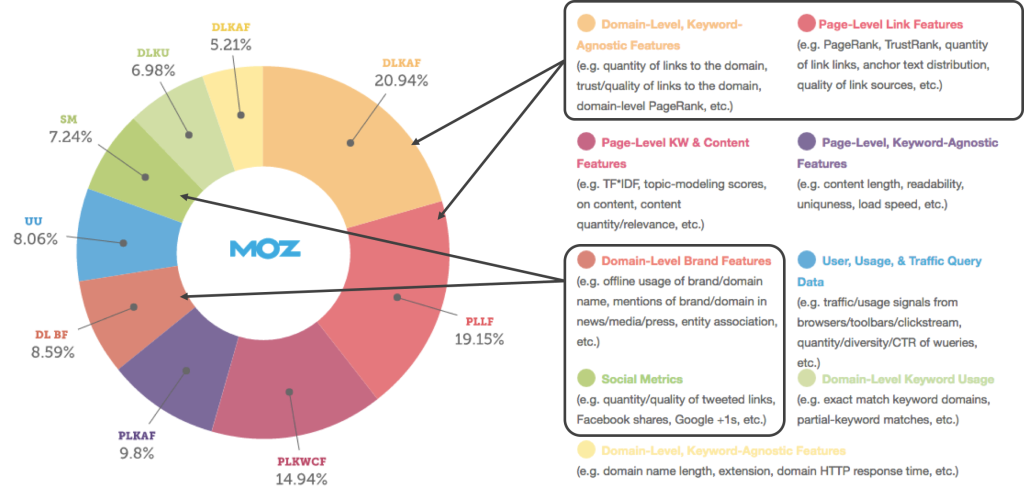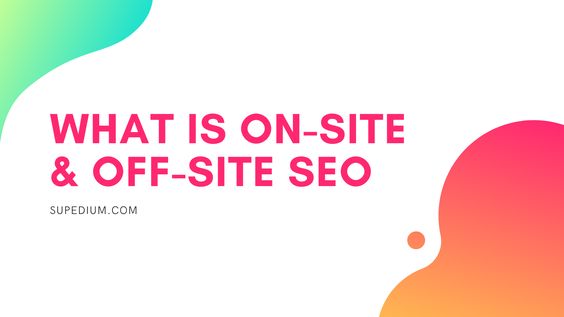Table of Contents
![]()
SEO is the practice of optimising your website’s traffic quantity and quality using organic search engine results.
What is On-Site SEO?
On-site SEO (also known as on-site SEO) is the practice of optimising elements in a web site to achieve a higher ranking and to earn better traffic from search engines in contrast to other Internet connexions and other external signals collectively known as “off-site SEOs.” SEO on-site refers to the optimization of a page’s content and HTML source code.
In addition to helping search engines to interpret page content, proper on-site SEO also helps users understand quickly and clearly what the content of a page is and whether it addresses their search query. Essentially, good on-site SEO helps search engines to understand what a human would look at (and what the value) if they visited a page so that search engines can reliably serve what human visitors would think about high-qualität search content (keyword).
The ultimate objective of on-site SEO can be considered to make search engines and users as easy as possible:
Understand the meaning of a webpage;
Identify this page as relevant to a search query or query (i.e. a specific keyword or keywords set);
Find this page worthy of a good ranking on the SERP search engine results page.
SEO has in the past been synonymous with the use of keywords — and in particular the use of a high-value keyword in several key locations on the website.
To understand why keywords are no longer at the centre of SEO on the website, it is important to keep in mind the terms: content topics. Historically, whether or not a page for a certain term was dependent on some expected spots on the right keywords to find and understand the content of the website by search engines. User experience was secondary. The on-site SEO practise simply focussed on ensuring that search engines found keywords and classified a site as relevant.
Today, however, search engines have become more sophisticated exponentially. It can extract a page meaning from the use of synonyms, the context in which content appears, or just the frequency of the word combinations. While keyword usage is still important, prescription methods like an exact match keyword are no longer an SEO holder at a specific location. Relevance is important. Just ask yourself how the contents are relevant to the user’s search query (based on the use of your keyword, both on your page and in its HTML).
In this way, on-site SEO deals less with repeating or placing keywords and more with understanding who your users are, what they are looking for, and which subjects (keyword) can you create content that best meets your needs. The content of the pages that fulfil these criteria is:
- In-depth. “Thin “content is one of the specific objectives of Google Panda; today, it is assumed that the content needs to be sufficiently thorough to be ranked well.
- Friendly to the user. Can the content be read? Is it organised so easily navigable on your website? Are the ads and affiliate links generally clean or littered?
- Only one. If not properly addressed, duplicates of content on your website (or elsewhere) may affect a site’s ability to classify itself as SERPs.
- Authoritative and reliable. Is your content a reliable resource for information about a specific subject?
Aligned with the intent of user search. The creation and optimization of quality content also address the search engine’s expectations. Content topics should be aligned with the search queries they rank for.
SEO on-site non-keyword related
In addition to the keywords (themes) used in the content on a webpage and how they are discussed, there are several elements of “keyword diagnostics” that can influence page optimization on-site.
These include things such as:
Use a link on a page: How many links are available? Are they inside or outside? Where are they pointing to?
- Loading page speed
- Use of structured Schema.org data or another markup
- Structure of the URL page
- Friendliness Mobile
- Metadata Page
What is Off-Site SEO?
“Off-Site SEO” refers to the measures taken outside of your site to affect your rankings in the search engine results pages (SERPs). “Off-Site SEO”
Optimization for off-site ranking factors involves improving site popularity, relevance, trustworthiness and authority perception of the search engine. This is achieved by linking to or promoting your website other reputable places on the Internet (pages, sites, guests, etc.) and effectively “associate” the quality of your content.
Why is SEO off-page important?
While search algorithms and ranking factors are changing constantly, the general agreement within the SEO community is that the relevance, confidence and authority of an effective off-page SEO continue to play a key role in a site’s rating ability.
While we do not know that the full Google algorithm ranks content, data from our Search Engine Ranking Factors study show that SEO-related factors off-site are likely to weight over 50 per cent of the ranking factor.

SEO links and off-page
Building backlinks are central to SEO off-page. Search engines use backlinks to show the quality of the content, so a site with many high-value backlinks usually ranks better than a site with fewer backlinks, which would otherwise be identical.
There are three main types of links defined by how they have been created: natural links, manually constructed connexions or self-created links.
Natural links are published editorially by a page owner without any action. For instance, a food blogger adding a connexion to a post pointing to their favourite farms is a natural link.
Manually constructed links are obtained by deliberate link-building activities. This includes things such as linking customers to your website or asking influencers to share their content.
Automatic links are created using practices such as the insertion of a backlink in an online directory or forum, a blog comment signature, or an optimised anchor text press release. Some self-created linking construction tactics tend to black hat SEO and are frowned upon by search engines, so tread easily here.
Regardless of how links have been established, those who contribute most to SEO efforts are usually the ones who are most equitable. Many signals contribute positively to the equity, for example:
- The popularity of the linked site
- How the topic of the link is related to the site
- The “freshness” of the connexion
- The text of the anchor used on the site
- The confidence of the linked site
- The number of links on the link page
- Domain and page link authority
Off-site non-link SEO
While links from outside websites are the most widely practised off-page SEO strategy, almost all activities a) outside your website and b) can help to improve your search rankings could be considered as off-page SEO.
- Marketing of social media
- Blogging Guest
- Connected and unconnected brand references
- Marketing Influencer
However, it is important to note that the net result of each of these activities is to somehow create a web reference to your website — be it a link, a mention of your brand or website or otherwise. It is important to note that So the concept of genuinely “non-linked” off-page SEO is a little misnomer!
Local off-page note SEO:
Off-page SEO is based on human behaviour (that is to say, people only refer to and share content). As such, both organic and local SEOs are applicable. Even in a brick and mortar company, high-quality products are provided with many words of mouth from current customers — the personal equivalent of off-page SEO.
How to perform SEO off-site?
At a high level, the “off-site SEO” of a website improves the search engine and user perception of the quality of a website. This occurs by obtaining links from other websites (especially reputable and trustworthy ones), your brand, your content shares and “trust vote” from sources outside your website.
Share This





Be the first to comment